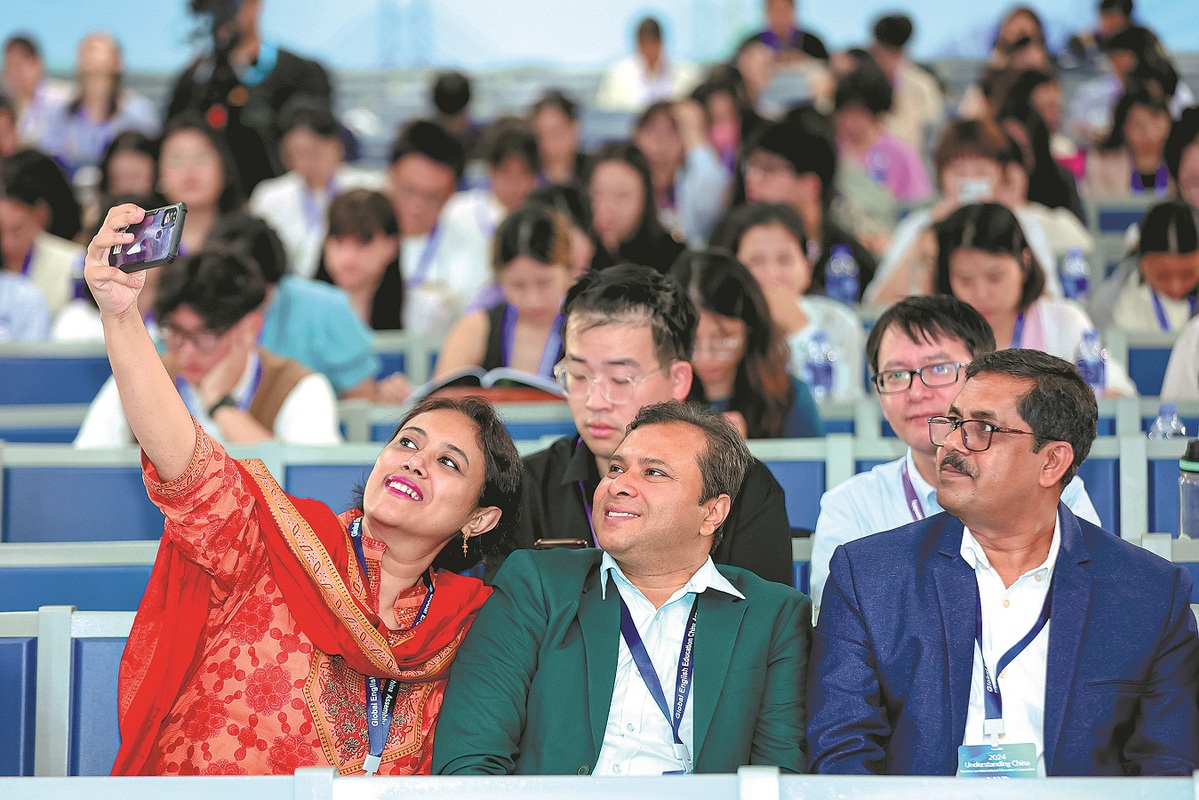 Participants pose for a selfie at the 2024 Global English Education China Assembly in Zhuhai, Guangdong province, on July 26, 2024. [Photo provided to China Daily]
Participants pose for a selfie at the 2024 Global English Education China Assembly in Zhuhai, Guangdong province, on July 26, 2024. [Photo provided to China Daily]
Chinese and foreign students are urged to further strengthen communication and cooperation so they can better understand their countries' true situations and cultures.
Experts and scholars attending the 2024 Global English Education China Assembly said the expansion of exchanges between Chinese and foreign students would help foreigners studying in China to better understand the conditions, culture and customs of the country. In turn, this will help increase mutual trust among Chinese and foreign students and contribute to the establishment of good relations between China and other countries in the following years, experts said.
The 2024 Global English Education China Assembly, which was jointly organized by China Daily, Beijing Normal University and Shanghai International Studies University, took place in Zhuhai, Guangdong province, from Friday to Sunday.
One of the event's seminars focused on international education collaboration. The seminar attracted educational institutions, teachers and students from around the world.
Cheng Aimin, a professor from Nanjing University in Nanjing, Jiangsu province, said domestic universities and colleges should work to enhance foreign students' empathy toward Chinese culture and the nation's real situation, help them better understand China and correctly view China's policies and guidelines as they study.
Such institutions should help Chinese students improve their ability to explain Chinese culture and boost their cross-cultural communication skills, allowing them to become ambassadors for economic and cultural exchanges and tell China's stories well, Cheng said.
Zhang Yanli, dean of the School of Chinese Studies and Exchange at Shanghai International Studies University, called for the further development of international communication capabilities and the creation of a more diverse national education system for international students studying in China.
"Chinese higher education institutions should organize activities for international students to participate in Chinese cultural activities, and cooperate with organizations and communities to promote interactions between international students and Chinese society," she said.
Such events would help international students better understand China and build a comprehensive perception of the nation, Zhang said.
During the seminar, foreign students studying at Jiangsu University in Zhenjiang, Jiangsu, talked about how they are deeply interested in China's long history and rich culture and impressed by the country's scientific and technological development and innovation capabilities.
Steiner Melanie Cujilema Campos, a native of Ecuador, said China has become a global leader in technology and innovation, particularly in 5G, artificial intelligence and e-commerce.
"But the rich history and traditions of China are evident in daily life, from the architecture of ancient temples to the celebration of festivals such as the Spring Festival and the Mid-Autumn Festival," said Campos, a business administration postgraduate student at Jiangsu University.
The food culture in China is diverse and fascinating, and each region has its unique flavor and specialties, which reflect the varied geography and history of the country, she said.
"That's why every time I have the opportunity to explore local cuisines, I enjoy every moment and cherish them with great emotion," she added.
Angelina Lisovenko from Russia said she has been exposed to the rich cultural heritage of China through various cultural events, festivals and traditions.
"The university has also facilitated interactions with local communities, allowing me to gain a deeper appreciation for the customs and values prevalent in Chinese society," said Lisovenko, who is majoring in international education at Jiangsu University.